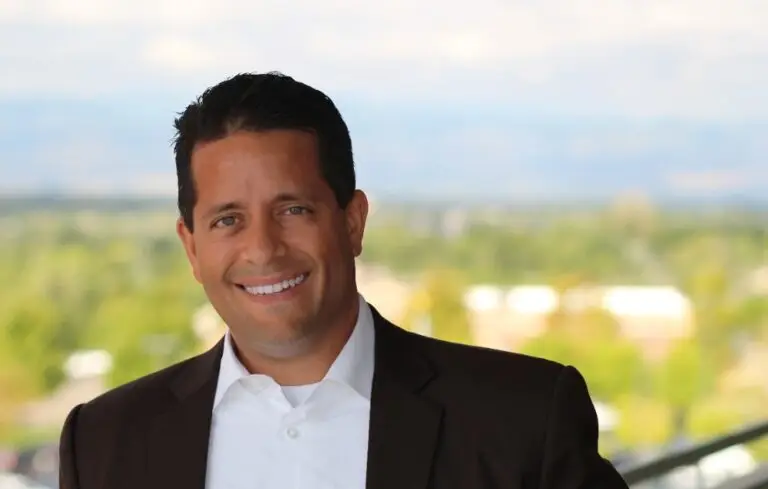 David Roberson spent a month running RoseRyan from Hawaii last year, and now the CEO is overseeing the entire accounting and financial services firm from a guesthouse in the backyard of his home in Silicon Valley. The website still cites an address on Bascom Avenue in nearby Campbell, California, but nobody works there anymore, and Roberson toils permanently amid redwoods, olive trees, roses and diffused sunlight a few yards from his patio.
David Roberson spent a month running RoseRyan from Hawaii last year, and now the CEO is overseeing the entire accounting and financial services firm from a guesthouse in the backyard of his home in Silicon Valley. The website still cites an address on Bascom Avenue in nearby Campbell, California, but nobody works there anymore, and Roberson toils permanently amid redwoods, olive trees, roses and diffused sunlight a few yards from his patio.
“Historically, as CEO you had to be where the business was,” says Roberson, who was CEO of Hitachi Data Systems before joining RoseRyan as a vice president in 2018 and becoming chief a year later. “But these days, I don’t think anyone cares where you live, to some degree. I just hired a chief of staff, and she’s in Dallas, and she only asked: ‘What hours do you want me to work?’ I said, ‘Same as mine, and we’ll be just fine.’”
Is Roberson right? Company chiefs always have been rovers, routinely traveling to meet with customers, lenders, politicians, suppliers and employees at far-flung operations. Digital communications loosened their ties to the corner office. Then, the pandemic blew the lid off the entire arrangement, forcing a remote management structure for most companies—and proving in most cases that it could work.
Now CEOs and boards are facing the important question of whether top leaders should go back to the physical C-Suite, even as this same group is also grappling with restructuring execution and culture around permanent work from home by many or most of their employees.
“Culture is becoming increasingly important, and the workplace is where culture is manifested,” says Sanjay Rishi, Americas CEO of JLL Work Dynamics. “But it’s a retention tool for companies to give some level of flexibility, and the tone from the top is extremely important. There’s so much moving around that there’s no one answer to any of this.”
For some, domicile has become a big factor in CEO recruiting. “Physical relocations can still be difficult, and that prospect can deter an attractive candidate,” says Peter Crist, chairman of the Crist/Kolder executive-search firm. “And if that occurs, companies need to be quick to have that as an important early-conversation tactic.”
In broad ways, the issue has arisen before, but usually in terms of potential abuse. For example, in 2007, amid the automaker’s steep financial losses, senior Ford Motor executive Mark Fields gave up the use of a corporate jet for his frequent trips from the company’s Michigan home to Florida. (Fields overcame that controversy to become Ford’s CEO in 2014, only to face ouster in 2017.)
The pandemic fueled speculation about whether a company’s headquarters can simply be where a CEO lives and whether it still matters where some enterprises are formally “based.” Still, having companies and their C-Suite offices in the same place remains the norm. Just ask Kellogg’s. CEO Steven Cahillane’s purchase of a $6 million mansion in Chicago’s Lincoln Park neighborhood, followed by Chief Growth Officer Monica McGurk buying a $2 million home several miles north in Winnetka, Illinois set off rumors that
the cereal maker was moving its headquarters to Chicago from iconic Battle Creek, Michigan. A company spokeswoman declined to comment on the issue to Chief Executive, but Kellogg’s has stated in the past that it’s staying put.
While having leadership on site remains the norm, the past two years of experimentation with remote work have raised the question of whether it’s necessary. For some, the answer is a resounding yes. “I’m opposed to commuter relationships or a distributed-management structure,” Crist says. “That always ends poorly, in my mind. The physical proximity of the top two or three players, maybe five, is really important.”
Hyliion CEO Thomas Healy believes it’s crucial for him to work on premises, where engineers and others are tinkering with the electric-locomotion systems for trucks being made by his Austin-based startup. He’s “primarily in the office,” Healy says, and so are his other top leaders, even as Hyliion allows most of its other 200 employees some work-from-home flexibility. “If I worked from home multiple days a week, or all the time, that would disconnect me from the organization and create a divide between operations and the rest of the staff,” he says.
Others, however, demur. Lizzie Horvitz founded Finch, a digital outfit that scores other companies’ products for ESG performance, during Covid and has never worked side-by-side with any of her employees. After running the startup from her bedroom at her parents’ house in New York City and from a condo in Wyoming where she was skiing, she’s now steering it from her home in Denver. Horvitz has no plans to get a formal office.
“Never say never, but I wouldn’t want to have to let people go if they don’t want to move,” Horvitz says. “I don’t think we’ll be in the same place for the foreseeable future.”
Separate locales for leadership and team members is also the plan at Intradiem, a call-center software company headquartered in Alpharetta, Georgia. Halfway through Covid, CEO Matt McConnell sold his house in suburban Atlanta and permanently decamped to Atlantic Beach, Florida. “I’d already traveled a fair amount, so I already could work where I was,” he says. “We announced in January that we’re a remote-first company and shifted to a remote-first culture, and we’re still defining it.”
For leaders weighing CEO domicile decisions, here are some factors to consider:
• Size and place matter. The smaller the company, of course, the easier for a CEO to chuck the office. “We work with Fortune 500 and Russell 2000 companies, and I haven’t had one CEO suggest he or she is thinking about running the company remotely,” Rishi says.
And if a company is outside big-city corridors or tax-haven states, Crist says, directors now “might get pushback like, ‘My family isn’t going to go there.’ Only a small minority love Omaha or have family there.”
• Beware the pitfalls. Every student of the workplace is examining companies’ post-pandemic performance to see whether less physical proximity and interaction translate into less or more productivity, and less or more innovation.
“Creating a culture when you’re a remote company is a real challenge,” says Joel Warady, CEO of Catalina Crunch, a snack company based in Indianapolis, who joined as CEO two years ago and has continued to run the company from his home in Chicago. He hadn’t even met most of his direct reports as of the first quarter of this year. “I don’t think any of us are experts at it. There’s a lot of trial happening.”
There is one big question especially for CEOs and directors: How does succession at the top work in an all-remote environment? “You need eyeball-to-eyeball interaction,” Rishi argues. “How can you do succession planning and mentorship and training when you’re remote? How do you tell how your top people react under pressure?”
• Corral the C-Suite. Untethered CEOs must continually coordinate with top lieutenants with whom they used to share offices every day. “We met every week in person; now we meet every week on Zoom,” Roberson says. “Our meetings are just as
effective, and our business is thriving right now in a totally remote environment.”
• Overcommunicate. Staying in touch with rank-and-file employees is arguably even more important now than it was during Covid, particularly for chiefs who decided on a permanent distributed-leadership model. McConnell alternates a virtual “town hall” meeting with all employees one week with a video he records the next week and puts out there for employee responses.
Warady is “a big user of text messaging, saying, ‘Do you have a minute?’, sort of like we used to be able to grab a cup of coffee with someone and just run ideas by them.” When he dials up direct reports, he says, “I try to spend the first 10 minutes of one-on-ones talking about personal things rather than business issues.”
• Consider the legalities. Should a chief of a U.S.-based company want to work primarily in, say, Galway, Ireland, foreign tax rules are likely to kick in, and that may affect the entire company’s legal domicile, says William Wright of the Fisher Phillips law firm. “The consequences for a CEO sometimes can be very painful, so it needs to be thought about.”
Even toggling between U.S. locales can be tricky for CEOs. For example, one complication of the increasingly popular departure of company chiefs from New York City to Florida is that New York lodges city taxes against individuals who spend more than 183 days a year there. “You can’t just be saying, ‘I was in Florida,’” says Nishant Mittal, senior vice president and general manager of business travel at Topia, a software company with a program that helps executives track their whereabouts and expenses. “There needs to be clear and convincing evidence.”
As for where all of this is headed: Crist recognizes that the remote CEO model is legitimate. But be believes “there will come a time when proximity will be very important again. I can sense it in the dialogue I have with boards and CEOs. Whenever this stuff goes away, we’ll try to get back to what we would define as normal.”







